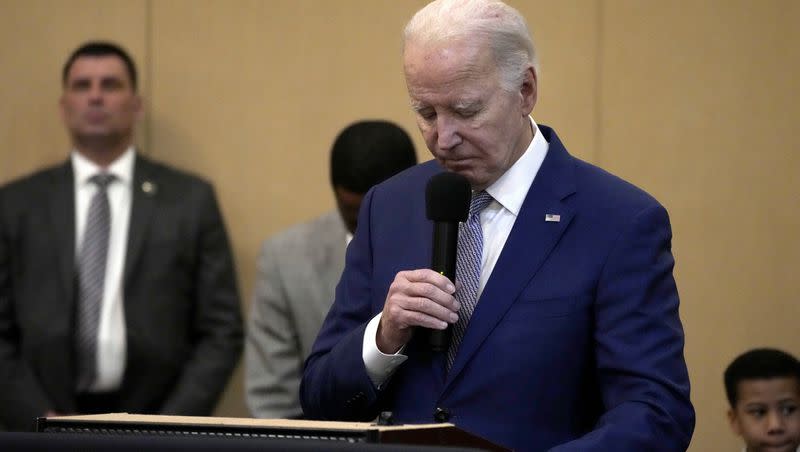Opinion: Biden has to find the ‘Goldilocks’ response to attacks on U.S. forces

- Oops!Something went wrong.Please try again later.
- Oops!Something went wrong.Please try again later.
Clearly, the United States so far has been unable to deter militant forces in the Middle East who wish to express their anger at U.S. support for Israel in the fight against Hamas.
Militias located in Syria and Iraq, and presumably backed by Iran, have launched more than 160 attacks against American soldiers since the start of that conflict on Oct. 7. Strategic airstrikes, the stock American response, have not deterred further attacks.
But now, three American soldiers are dead and 25 more injured after a drone — one The Wall Street Journal said might have been mistaken for a simultaneously returning American drone — entered a base in Jordan over the weekend and opened fire.
President Joe Biden faces a difficult decision. Respond weakly and the nation’s enemies may be emboldened. Respond too provocatively and the United States may find itself drawn into a larger conflict.
Despite the criticisms of Republicans this week, former President Donald Trump faced much the same dilemma in 2019 after Iran had shot down a U.S. surveillance drone. He ordered airstrikes against Iran, then abruptly called them off after planes were already in the air, according to The New York Times.
Back then, Trump told reporters, “For all of those that say, ‘Oh, they should do it, it shows weakness,’ actually, in my opinion, it shows strength.”
Indeed, freedom-loving superpowers can show strength through restraint. But when American blood is spilt, the stakes are higher.
The U.S. response to militant groups’ incessant attacks has not deterred them, but there is little evidence to show that larger attacks against perpetrators would do so, either. Certainly, the United States has a huge obligation to protect the lives of its armed forces. It cannot continue to let them absorb endless attacks from enemies.
Many Americans may not appreciate the dangerous global situation the United States and its allies currently face.
Writing for Foreign Affairs this month, Hal Brands, a senior fellow at the American Enterprise Institute, likened the current situation to that of the 1930s. Then, Italy, Germany and Japan shared the goal of spreading their totalitarian influence militarily in regional conflicts. They coalesced into an axis that, once Japan attacked the United States, erupted into a world war.
Today, Russia, China and Iran have the potential to form a similar alliance. They are linked by “autocratic governance and geopolitical grievance; in this case, a desire to break a U.S.-led order that deprives them of the greatness they desire,” Brands wrote.
Historical events never repeat themselves completely. Certainly, another world war is not inevitable. But Iran and its proxies are working to thwart Israeli and American influence in the Middle East.
And now the world waits for President Biden’s response.
It must be appropriate, yet smart.
Brian Katulis, a senior fellow at the Middle East Institute who worked in national security positions under President Bill Clinton, told The New York Times, “I’m sure they (the Biden administration) are looking for some kind of Goldilocks response here.” That is, “not too hard” that it provokes a full-fledged war, “not too soft” that it just provokes more attacks, “but something that seems just right.”
Anything that expands the current conflict between Israel and Hamas, or draws the U.S. further into it militarily, would be a disaster. Among other things, it might signal that the United States is too occupied in that crisis to respond to other global crises, emboldening other nations to act out militarily in their own regions.
These circumstances ought to push the United States to reexamine its own military readiness and its resolve toward its allies.
Restraint can indeed show strength, but only if the world understands the awful consequences of continuing to poke and provoke.

